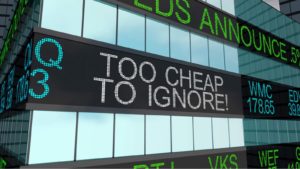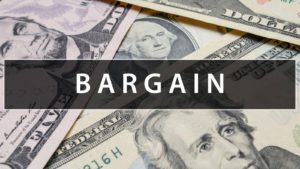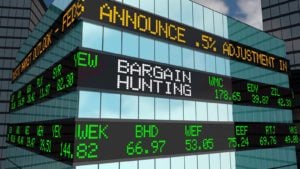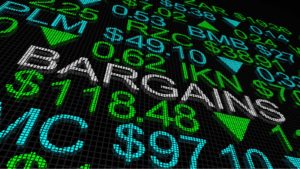When it comes to the best undervalued stocks to buy now, some of the best names in this category are those utilizing return-of-capital efforts to maximize shareholder value. In other words, dividends and stock buybacks. Both return-0f-capital types have their advantages and disadvantages.
However, while some investors prefer the “cash in hand” aspect of dividends, and last year’s implementation of a 1% excise tax on share repurchases has made stock buybacks a less tax-efficient strategy than it was in the past, buybacks are still a factor that can help boost long-term total returns. Why? Share repurchases reduce the number of outstanding shares. This boosts both earnings per share (or EPS), as well as the underlying value of a stock per share.
While buybacks may not eliminate the gap between the underlying value and trading price of an undervalued stock, they can narrow such gaps. With this, if you are a value investor, you may want to focus on undervalued stocks with strong buyback programs. These seven stocks below all trade at relatively-low valuations, and have in the past year launched or expanded share repurchases.
| BTU | Peabody Energy | $24.02 |
| CPRI | Capri Holdings | $41.50 |
| DFS | Discover Financial | $103.47 |
| HRB | H&R Block | $33.91 |
| KBH | KB Home | $43.82 |
| LOW | Lowe’s | $207.83 |
| TRV | Travelers Companies | $181.14 |
Peabody Energy (BTU)

Peabody Energy (NYSE:BTU) is a leading coal mining firm. Despite the push to end the use of coal, coal demand has bounced back in a big way in recent years. This has been a boon to Peabody, both in terms of profitability and its share price.
At the same time, though, the consensus is that coal’s days as a fuel source are still numbered. As a result, even after rallying nearly 24-fold since late 2020, BTU stock trades at an extremely discounted valuation of just 3 times earnings.
However, BTU may have a further runway, thanks to recently-announced plans for a “robust shareholder return program.” Along with plans to buy back up to $1 billion in shares (representing 29% of its market cap), the company could soon also become one of the undervalued stocks with dividends, with its plans to begin providing investors with a variable payout.
Capri Holdings (CPRI)

Capri Holdings (NYSE:CPRI) is the parent company of fashion brands Michael Kors, Versace, and Jimmy Choo. While shares made a strong comeback during the post-pandemic “reopening,” recession fears have put pressure on this luxury goods stock since 2022.
Due to the macro concerns, CPRI stock today trades at a low valuation of just 7.8 times earnings. Beyond the fact this discounted multiple likely accounts for the risk of a 2023 recession, the company’s aggressive share repurchase program could turbo-charge potential upside, once economic conditions improve.
Over the past year, Capri has bought back 21.9 million, or nearly 15%, of its outstanding shares. Based on share repurchases during the December quarter, CPRI has around $700 million in its latest buyback program. That represents about 13.5% of the company’s current market cap. With this, consider Capri one of the best undervalued stocks to buy now.
Discover Financial Services (DFS)

Discover Financial Services (NYSE:DFS) is another undervalued name pursuing buybacks to reward its shareholders. Already buying back billions worth of its shares through an existing buyback program, the digital banking and payment services giant just announced a new share repurchase program.
This new program authorizes the company to buy back as much as $2.7 billion worth of DFS stock, between now and June 30, 2024. This represents about 10.4% of DFS’s current market cap. While this program may not be as aggressive as the first two listed above, that doesn’t mean you should pass up on it in favor of other buyback plays.
Don’t forget too that DFS also offers its investors a solid dividend (forward yield of 2.75%). Add in a likely rebound after the current economic downturn plays out, and there’s much to suggest that DFS could deliver strong returns from here for investors.
H&R Block (HRB)

H&R Block (NYSE:HRB) has been a “boring” stock that has performed quite well in recent years. Back in Feb., a Barron’s columnist opined that the tax preparation company’s success so far in moving into related, less seasonal financial services has been a major reason for this.
Along with the further implementation of this strategy, there’s something else that could fuel the big round of strong returns for HRB stock: dividends and buybacks. HRB currently has a forward dividend yield of 3.41%. As InvestorPlace’s Josh Enomoto recently pointed out, this stock has a low payout ratio.
This suggests that HRB’s payout (which has grown by about 3.5% annually over the past five years) is sustainable. As for the buyback plans, H&R Block has $900 million left in its latest authorized share repurchase program, which runs through June 2025. This represents around 17.4% of the company’s market cap.
KB Home (KBH)

Given that fears of a housing bust have spiked over the past year, you may be surprised to hear that shares in homebuilder KB Home (NYSE:KBH) have performed quite well in the last twelve months.
During this time frame, KBH stock is up by around 31%. Yet besides the fact that another shoe has yet to drop with housing (helping the company sustain profitability), KB’s aggressive repurchase of shares has likely also been a factor in its strong stock price performance.
Over the past two years, KB Home has reduced its share count by around 12%. The company just recently announced plans to buy back another $300 million in KBH shares, representing around 5.6% of its current market cap. If you’re bullish that housing is in for a soft landing at worst, KBH may just well be one of the best undervalued stocks to buy now.
Lowe’s (LOW)

Admittedly, Lowe’s (NYSE:LOW) isn’t as “deep value” as the five preceding undervalued buyback stocks. While those names sport price-to-earnings (or P/E) ratios in the single-digits, shares in the home improvement retailer trade for 20.5 times earnings.
However, if you’re looking for undervalued growth stocks to watch, consider LOW stock. Sell-side forecasts call for steady earnings growth between now and the fiscal year ending Jan. 2026. The company also has a long track record of dividend growth. Lowe’s has 59 years of consecutive annual dividend increases.
LOW’s current forward yield is 2.05%. The company has increased its payout by an average of 20.7% annually over the past five years. Atop these strengths are LOW’s bona fides as a strong buyback stock. Last December, Lowe’s announced the launch of a $15 billion stock buyback plan. $15 billion represents 12.3% of the company’s current market cap.
Travelers Companies (TRV)

Trading for around 15.4 times earnings, at first glance Travelers Companies (NYSE:TRV) may not appear to be particularly cheap. Yet while this property and casualty insurer may at best be moderately undervalued compared to some of its peers, it could still generate strong returns.
In large part, thanks to the company’s share repurchase programs. As discussed in its latest earnings report, the company bought back $462 million worth of TRV stock last quarter, and its board has authorized an additional $5 billion worth of additional share repurchases.
That represents a fair amount of TRV’s outstanding shares, given the insurer’s current market cap ($41.6 billion). Along with buybacks, Travelers is returning cash to shareholders as well via its dividend (forward yield of 2.2%). Growing this payout 17 years in a row, the average annual dividend growth in the past five years has come in at 5.25%.
On the date of publication, Thomas Niel did not hold (either directly or indirectly) any positions in the securities mentioned in this article. The opinions expressed in this article are those of the writer, subject to the InvestorPlace.com Publishing Guidelines.
